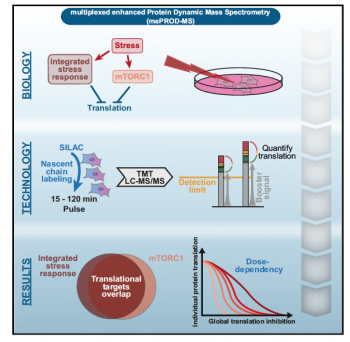04 Dec 2019 - mePROD proteomics enables measurement of acute translational changes.
As published in today’s online issue of Molecular Cell, the Münch Group added signal amplification to dynamic SILAC-driven multiplexing proteomics, resulting in a quantum leap with respect to detection of small signal changes. They dubbed their new method as “mePROD” proteomics – for multiplexed enhanced proteins dynamics – and showed that it enables precise and in-depth quantification of nascent protein chains shortly after labeling. Technically, the signal amplification was achieved by adding a booster channel that increases the signal of interest in a sample. mePROD provides with unprecedented insight into minute translational changes occurring e.g. after stress signals. It is a highly sensitive approach which comes at a low cost and adds a completely new layer of information, therefore complementing established methods for translatome analysis like Ribo-Seq. In addition, it is applicable in situations where sample size is limiting, as it needs only about 100,000 cells.
The team around Christian Münch utilized the technology to solve one of the longstanding conundrums in cellular stress response research. They showed that the two pathways of the integrated stress response (ISR) and mTOR inhibit the same translational targets. Target specificity is driven by global translational status and not by the upstream pathway triggered.
